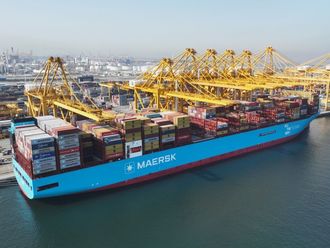Melbourne: Glencore Plc surged to more than double from last week’s record low after saying it will cut zinc production by a third, sparking the biggest-ever rally in the metal’s price.
The announcement that it will reduce output follows similar steps Glencore has taken in curbing copper and coal supply as it navigates a collapse in raw materials that’s wiped $37 billion from its market value this year. Zinc, used to galvanise steel, jumped as much as 12 per cent in London, the most since at least 1989.
The Swiss miner and trader is restructuring its finances and operations as it seeks to allay investor concern it carries too much debt. As one of the world’s biggest suppliers of base metals such as copper, nickel and zinc, Glencore’s metals and minerals businesses delivered about 30 per cent of its revenue last year. The shares jumped as much as 11 per cent in London.
“Glencore is showing industry discipline by cutting unprofitable tons and saying it is worth more value to leave the tons in the ground,” Heath Jansen, a Citigroup Inc. analyst, wrote in a report Friday. “We expect assets to remain out of production until zinc prices improve materially and stay higher.”
The move is unlikely to affect analysts’ earnings estimates for the company or cash-flow forecasts as the operations are unprofitable at current prices, according to Citigroup.
Annual zinc output will fall by about 500,000 metric tons as Glencore suspends or cuts output from mines in Australia, Peru, and Kazakhstan, it said Friday in a statement. Global production was 13.3 million tons in 2014, according to the US Geological Survey, making the reduction equivalent to almost 4 per cent of world output.
Industry ‘Trailblazer’
“Maybe they are the trailblazer, as there’s the spectre of oversupply in many commodities,” James Wilson, a Morgans Financial Ltd. analyst, said by phone from Perth. “If you want higher prices for a commodity, you need to create price tension and to have less product in the market. Glencore’s doing that, though maybe under duress, and it’s something that other big companies should be thinking of.”
The curbs will shave about 100,000 tons from its fourth- quarter output, Glencore said, while production of other metals including lead and silver will also be affected. Zinc reached $1,875 a ton on the London Metal Exchange, the highest since Aug. 11. Before Glencore’s announcement, it had fallen 23 per cent this year.
Tumbling Prices
“The main reason for the reduction is to preserve the value of Glencore’s reserves in the ground at a time of low zinc and lead prices, which do not correctly value the scarce nature of our resources,” the company said. Glencore is “positive about the medium and long-term outlook for zinc, lead and silver prices.”
Glencore rose as high as 134.45 pence in London, more than doubling from the low on Sept. 28, when it plunged by the most since its initial public offering in 2011. The stock was at 133.8 pence by 12:02pm in London.
The shares had slumped after analysts expressed worries over the pace of its $10 billion debt-reduction program. Glencore erased those losses after rebutting the concerns and as investors including the sovereign wealth fund of Singapore were said to have expressed interest in a minority stake in its agriculture business.
Commodities prices have slid in recent months as producers of metals to energy struggle to curb surpluses due to slower economic expansion in China. The nation accounted for half of the world’s refined zinc consumption in 2014, according to Bloomberg Intelligence.
Copper Closures
Glencore’s decision “may be an indication of just how weak demand is at the moment,” Ben Crowley, an analyst at Perth- based Macquarie Group Ltd., said by phone. The producer’s full- year zinc output in 2014 was 1.4 million tons, according to its annual report.
The Baar, Switzerland-based company plans to shutter copper mines in Africa accounting for about 2 per cent of global supply after prices in August touched a six-year low. Copper prices will respond to the cutbacks, Glencore’s billionaire Chief Executive Officer Ivan Glasenberg said Monday in London.
“Glencore will not push incremental volumes into markets that don’t need them,” Peter Freyberg, its head of coal, said in a speech Wednesday, referring to the cuts made by his division in February, when it announced it would reduce its Australian coal output by 15 million tons this year.
While the zinc output curbs are considered temporary, Glencore will reduce staff numbers at its mines, it said in the statement. The company employs about 180,000 people across more than 150 mining and metallurgical, oil production and agricultural assets.












